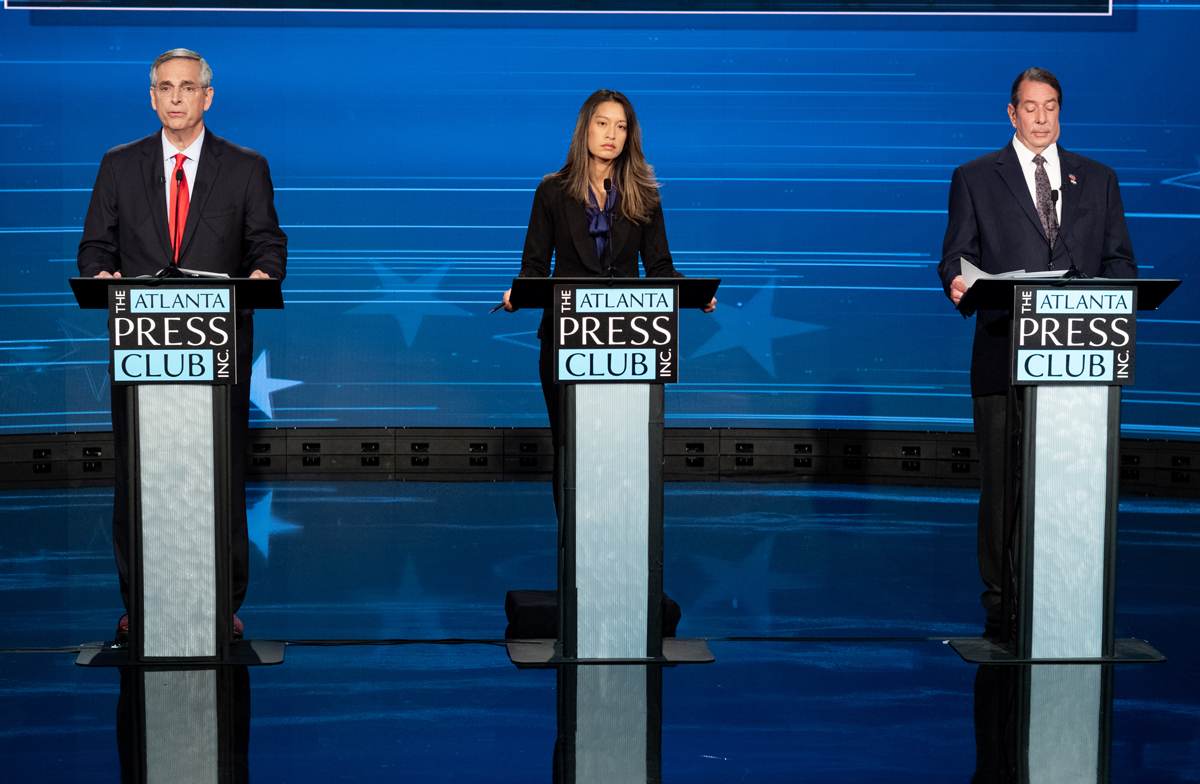
Photograph by Ben Gray/AP
Back in the not-so-distant past, you’d be hard-pressed to find a Georgian who knew the Secretary of State’s name, let alone what that official did all day. That changed during the historic 2020 election, which threw Georgia’s election results into the national spotlight and made a minor celebrity out of Georgia Secretary of State Brad Raffensperger.
Raffensperger, a Republican, is now running for reelection, facing Democrat challenger Bee Nguyen, a rising star in the state Democratic party who currently serves in the state legislature. The race has focused on what is arguably the Secretary of State’s most important role: administrating the state’s elections. On Tuesday, Raffensperger and Nguyen squared off in a debate hosted by the Atlanta Press Club, joined by Libertarian candidate Ted Metz, a retired insurance professional who’s staked his campaign on paper balloting and hand-count elections. And while the Secretary of State has many other jobs, from preserving public records to conferring professional state licenses, elections played the starring role at this debate.
Like other Democrats on the November ballot, Nguyen has been a vocal critic of SB 202, the elections bill that Republicans state lawmakers passed over Democratic opposition in the wake of the 2020 election. During the debate, Nguyen called for a repeal of certain portions of the law—including a statute that allows for unlimited challenges to individual votes—which Nguyen said are creating chaos for already-overburdened elections boards. In Gwinnett County alone, right-wing activists have contested the legitimacy over 37,000 registered voters, and the majority of the challenges have been dismissed upon scrutiny. Raffensperger supports SB 202, but conceded the voter challenge statute has led to “frivolous challenges,” and said that if reelected, he’ll encourage the legislature to address the issue.
Nguyen criticized Georgia’s existing election laws for their failure to protect poll workers and their families: during the “Stop the Steal” movement following the 2020 election, many Georgia county-level election workers were stalked and harassed, many of them receiving death threats. Last June, testifying at a hearing of the House Committee investigating the January 6 riots, Fulton County election worker Shaye Moss tearfully described how vigilantes showed up at her grandmother’s home attempting a “citizen’s arrest” of her and her mother. Nguyen said, if elected, she would put “a plan in place to protect poll workers and their family members,” noting that Senator Jon Ossoff has introduced similar legislation at the federal level.
Raffensperger garnered praise across the country for his role in defending Georgia’s 2020 election results, particularly after a phone call between Raffensperger and President Trump was made public, in which Trump asked the Secretary to “find 11,780 votes” for him (that call is now part of an investigation by Fulton County DA Fani Willis). He’s running on that legacy during this year’s campaign, positioning himself as a “rule of law” official who honors the Constitution. He defended his office’s “voter roll cleanups,” which seek to identify and purge the registrations of voters who have moved or died, which many voting rights advocates say has resulted in legitimate voters being cancelled, often without their knowledge.
“We live in a dynamic, mobile society,” Raffensperger said. “It’s important for us to update our voter rolls.” He called for better integration with interstate databases to track voters moving in and out of Georgia, and for annual county-level voter roll maintenance.
Though much of the debate focused on the technicalities of election law, Nguyen used one of her allotted questions to attack Raffensperger on his abortion rights record, noting that Georgia nurses—whose professional licensing is administered under the Secretary of State —should think twice before voting for an anti-choice official. As a state lawmaker, Raffensperger sponsored a “personhood amendment” giving full legal rights to unborn fetuses; he’s also received endorsements from several major anti-abortion organizations.
Raffensperger was vocal about his abortion stance when running for Secretary of State in 2018, but Nguyen pointed out that he’s been largely quiet on the issue this season. “You wanted to talk about abortion back then,” Nguyen said. “Why don’t you want to talk about it now?” Raffensperger deflected, saying the question showed that Nguyen didn’t “understand the office” of Secretary of State, but Nguyen’s attack underscored the critical role abortion rights are playing up and down the ballot.
Ted Metz, the libertarian candidate, has a slim chance at the seat, though he could force a runoff between the two mainline candidates. Despite those slim odds, he made ample use of his stage time, arguing that his approach as Secretary of State would put a stop to corruption, which he claims impacted the outcome of the 2020 presidential election.
Metz called for an end to electronic ballot counting, saying votes cast and hand-counted on paper would be more secure. “Once you put things into a computer system, your votes become a fractionized…data point.” Panelist Mark Niesse pointed out that studies have found this method to be less secure and more expensive and time consuming, but Metz denied this, saying, “They do it in France…they go to election day, it’s all hand-counted at the precinct level, and the election results are done that night.”
“I’m the only candidate on this stage,” Metz told viewers, “Who would end these election shenanigans.”
Midterm elections are on Tuesday, November 8. Early voting began Monday, October 17, and will run until Friday, November 4.








![The North Carolina Museum of Natural Sciences’ newest exhibit is a [pre]historic first](https://cdn2.atlantamagazine.com/wp-content/uploads/sites/4/2024/04/DD-3-100x70.jpg)




